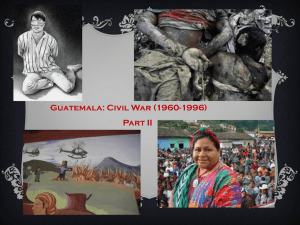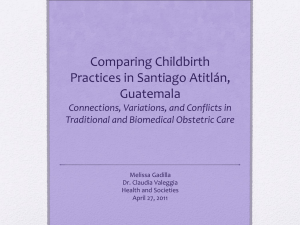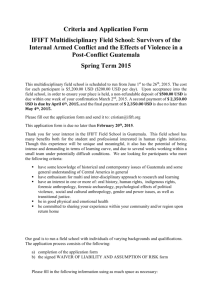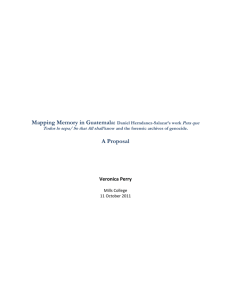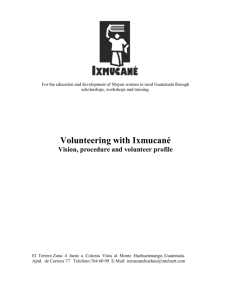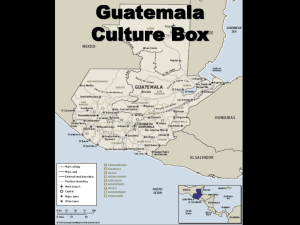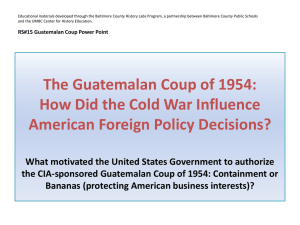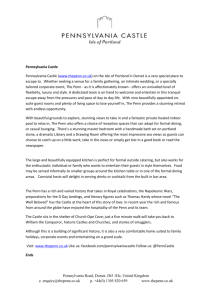Guatemala-Penn Partnership Annual Report 2013 ()
advertisement
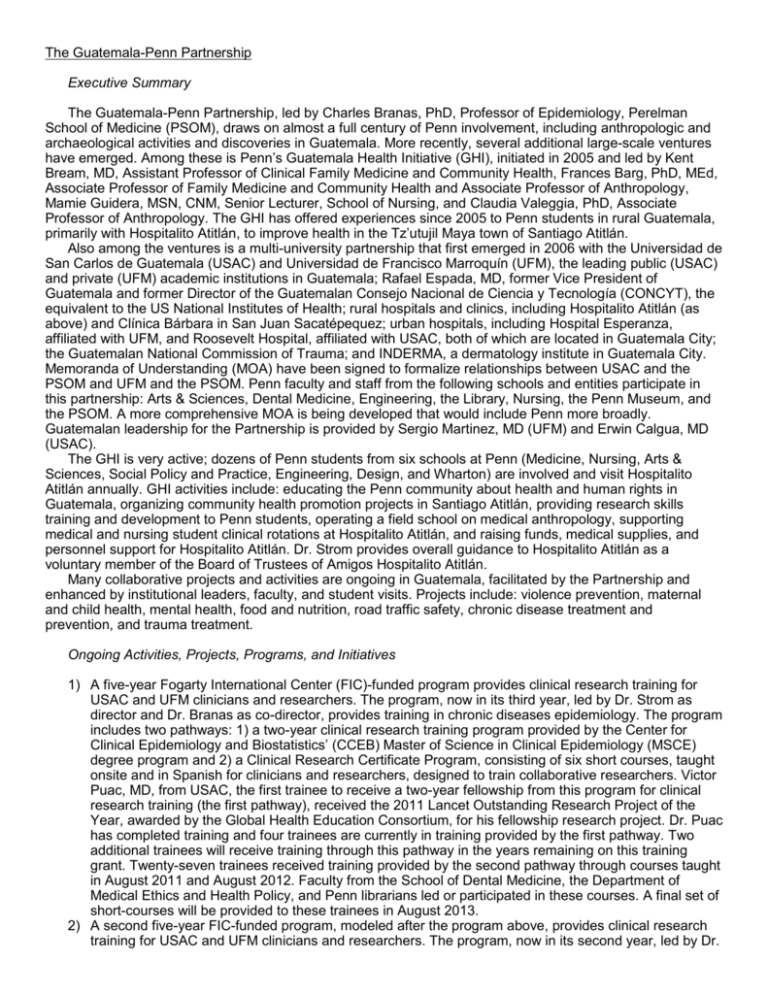
The Guatemala-Penn Partnership Executive Summary The Guatemala-Penn Partnership, led by Charles Branas, PhD, Professor of Epidemiology, Perelman School of Medicine (PSOM), draws on almost a full century of Penn involvement, including anthropologic and archaeological activities and discoveries in Guatemala. More recently, several additional large-scale ventures have emerged. Among these is Penn’s Guatemala Health Initiative (GHI), initiated in 2005 and led by Kent Bream, MD, Assistant Professor of Clinical Family Medicine and Community Health, Frances Barg, PhD, MEd, Associate Professor of Family Medicine and Community Health and Associate Professor of Anthropology, Mamie Guidera, MSN, CNM, Senior Lecturer, School of Nursing, and Claudia Valeggia, PhD, Associate Professor of Anthropology. The GHI has offered experiences since 2005 to Penn students in rural Guatemala, primarily with Hospitalito Atitlán, to improve health in the Tz’utujil Maya town of Santiago Atitlán. Also among the ventures is a multi-university partnership that first emerged in 2006 with the Universidad de San Carlos de Guatemala (USAC) and Universidad de Francisco Marroquín (UFM), the leading public (USAC) and private (UFM) academic institutions in Guatemala; Rafael Espada, MD, former Vice President of Guatemala and former Director of the Guatemalan Consejo Nacional de Ciencia y Tecnología (CONCYT), the equivalent to the US National Institutes of Health; rural hospitals and clinics, including Hospitalito Atitlán (as above) and Clínica Bárbara in San Juan Sacatépequez; urban hospitals, including Hospital Esperanza, affiliated with UFM, and Roosevelt Hospital, affiliated with USAC, both of which are located in Guatemala City; the Guatemalan National Commission of Trauma; and INDERMA, a dermatology institute in Guatemala City. Memoranda of Understanding (MOA) have been signed to formalize relationships between USAC and the PSOM and UFM and the PSOM. Penn faculty and staff from the following schools and entities participate in this partnership: Arts & Sciences, Dental Medicine, Engineering, the Library, Nursing, the Penn Museum, and the PSOM. A more comprehensive MOA is being developed that would include Penn more broadly. Guatemalan leadership for the Partnership is provided by Sergio Martinez, MD (UFM) and Erwin Calgua, MD (USAC). The GHI is very active; dozens of Penn students from six schools at Penn (Medicine, Nursing, Arts & Sciences, Social Policy and Practice, Engineering, Design, and Wharton) are involved and visit Hospitalito Atitlán annually. GHI activities include: educating the Penn community about health and human rights in Guatemala, organizing community health promotion projects in Santiago Atitlán, providing research skills training and development to Penn students, operating a field school on medical anthropology, supporting medical and nursing student clinical rotations at Hospitalito Atitlán, and raising funds, medical supplies, and personnel support for Hospitalito Atitlán. Dr. Strom provides overall guidance to Hospitalito Atitlán as a voluntary member of the Board of Trustees of Amigos Hospitalito Atitlán. Many collaborative projects and activities are ongoing in Guatemala, facilitated by the Partnership and enhanced by institutional leaders, faculty, and student visits. Projects include: violence prevention, maternal and child health, mental health, food and nutrition, road traffic safety, chronic disease treatment and prevention, and trauma treatment. Ongoing Activities, Projects, Programs, and Initiatives 1) A five-year Fogarty International Center (FIC)-funded program provides clinical research training for USAC and UFM clinicians and researchers. The program, now in its third year, led by Dr. Strom as director and Dr. Branas as co-director, provides training in chronic diseases epidemiology. The program includes two pathways: 1) a two-year clinical research training program provided by the Center for Clinical Epidemiology and Biostatistics’ (CCEB) Master of Science in Clinical Epidemiology (MSCE) degree program and 2) a Clinical Research Certificate Program, consisting of six short courses, taught onsite and in Spanish for clinicians and researchers, designed to train collaborative researchers. Victor Puac, MD, from USAC, the first trainee to receive a two-year fellowship from this program for clinical research training (the first pathway), received the 2011 Lancet Outstanding Research Project of the Year, awarded by the Global Health Education Consortium, for his fellowship research project. Dr. Puac has completed training and four trainees are currently in training provided by the first pathway. Two additional trainees will receive training through this pathway in the years remaining on this training grant. Twenty-seven trainees received training provided by the second pathway through courses taught in August 2011 and August 2012. Faculty from the School of Dental Medicine, the Department of Medical Ethics and Health Policy, and Penn librarians led or participated in these courses. A final set of short-courses will be provided to these trainees in August 2013. 2) A second five-year FIC-funded program, modeled after the program above, provides clinical research training for USAC and UFM clinicians and researchers. The program, now in its second year, led by Dr. Branas as director and Teresa Richmond, PhD, Andrea B. Laporte Endowed Term Associate Professor of Nursing, as co-director, provides training in trauma and injury clinical research. Pathways provided by the trauma and injury training program are the same as the pathways for the chronic diseases training program. Two trainees are currently in training provided by the first pathway. Two additional trainees will receive training through this pathway in the years remaining on this training grant. Twentyseven trainees received training provided by the second pathway through courses taught in August 2011 and August 2012. A final set of short-courses will be provided to these trainees in August 2013. 3) Francis Barchi, PhD, MBE and Jon Merz, JD, PhD provided leadership in 2011-12 for an FIC-funded supplement to the chronic diseases clinical epidemiology training program led by Dr. Strom (see above) that had three aims: 1) develop a short course in responsible conduct of research taught to USAC and UFM clinicians and scientists as part of the Clinical Research Certificate Program (second pathway), taught onsite and in Spanish in August 2012; 2) develop a one-semester course in research ethics and responsible conduct of research taught in the spring semester 2013 to USAC and UFM trainees pursuing MSCE training through the first pathway; and 3) evaluate both the short course and semesterlong course to gauge the effectiveness of the curriculum and to make necessary revisions to enhance future use in Guatemalan research ethics and responsible conduct of research courses in the future. Drs. Barchi and Merz worked with Luis Lopez, MD (USAC) in the conduct of this project. Drs. Barchi and Merz, together with Megan Kasimatis-Singleton, JD, MBE, are collaborating with USAC institutional leaders to develop a proposal in response to the FIC program announcement for an International Research Ethics Education and Curriculum Development Award (R25), to be submitted in May 2013. They visited Guatemala in April 2013 to finalize plans for the submission. 4) Dr. Branas, Dr. Barg, the Penn Museum, and Guatemalan partners collaborated on a recently completed comprehensive book detailing Penn’s 50 year history with Guatemala and the full breadth of Penn’s current activities in Guatemala. The book will be ready for publication and distribution soon. Penn Biomedical Library staff will create a web-based version of the book. 5) Dr. Branas continues his longstanding collaboration with Dr. Martinez, the Guatemala National Morgue System and the Instituto Nacional de Estadistica (the Guatemalan Census Bureau) to conduct various descriptive health analyses using geographic information systems (GIS), including mapping of points, polygons, movement, diffusion, distance and time calculations, and various map algebra activities. 6) A collaboration continues with Raphael Espada, MD, the former Vice President of Guatemala, and the Guatemalan National Commission on Trauma, led by Dr. Martinez, Rudolf Garcia-Gallont, and Dr. Branas (representing Penn), designed to enhance health and safety in Guatemala. This collaboration has been supported publicly and has contributed to activities such as the development of hospital trauma registries and violence prevention strategies for the country and plans to designate a select few hospitals as the first accredited Guatemalan trauma centers in the country's history. 7) Dr. Branas, in collaboration with Drs. Puac and Bream, and other investigators in public health and the global health residency program, are completing a study of nearly 100 urban and rural Guatemalans and their experiences with the past civil war, substance abuse, and violence. 8) Dr. Branas is collaborating on a project with USAC and the Guatemalan Ministry of Health on a random sample of chronic diseases across Guatemala with 5000 respondents. 9) Dr. Puac, a Guatemalan trainee supported by the FIC-funded training program for physicians and scientists with interests in trauma and injury (see above), in collaboration with Dr. Branas, is conducting a national study of nearly 1500 Guatemalans and their experiences of violence and mental health problems. 10) Marilyn Santana, MD, a Guatemalan trainee supported by the FIC-funded training program for physicians and scientists with interests in chronic diseases (see above), in collaboration with Karen Glanz, PhD, MPH, is conducting a cross-sectional survey with the following aims: 1) determine the prevalence of diabetes in San Juan Sacatepéquez, Guatemala; 2) determine the proportion of unknown cases among diabetics; 3) determine whether glycosylated hemoglobin (HbA1c) of self-reported diabetics is well-controlled; and 4) study the association between known risk factors for diabetes with hyperglycemia as measured by HbA1c. 11) Dorian Ramirez, MD, a Guatemalan trainee supported by the FIC-funded training program for physicians and scientists with interests in trauma and injury (see above), in collaboration with Dr. Branas, is conducting a national study of the occurrence of violence and Guatemalan medical system usage immediately following the distributions of salaries on paydays in Guatemala (violencia para el dia de pago). The specific aim for Dr. Ramírez’ project is to determine if fatal and non-fatal violence are associated with the biweekly payment pattern (payday weeks, at the middle and at the end of each month). Preliminary data analysis has been conducted for this project. Dr. Ramírez anticipates that the results of the study will be valuable for the development of policies and programs in Guatemala to prevent and control interpersonal violence. 12) Angel Velarde, MD, a Guatemalan trainee supported by the FIC-funded training program for physicians and scientists with interests in chronic diseases (see above), in collaboration with Dr. Strom, is conducting an investigation entitled: “Low vitamin D serum levels are associated with pneumonia in children.” This is a case control study, conducted with the cooperation of the Ministry of Health of Guatemala and the Department of Pediatrics, Roosevelt Hospital, Guatemala City, Guatemala. If results of this study are promising, Dr. Velarde hopes to conduct a larger clinical trial in Guatemala. 13) Vivian Salomon, MD, a Guatemala trainee supported by the FIC-funded training program for physicians and scientists with interests in trauma and injury (see above), in collaboration with Dr. Branas, is designing a study on intimate partner violence. Dr. Salomon plans to conduct an observational study in Guatemala, utilizing subjects who have been exposed to intimate partner violence as children. They will be followed over time to determine if they have been exposed to intimate partner violence and other violence outcomes as adults. 14) Monica Paz, MD, a Guatemalan trainee supported by the FIC-funded training program for physicians and scientists with interests in chronic diseases (see above), in collaboration with David Margolis, MD, PhD, is developing a research project focusing on the prevalence of eczema in a population of children in the community of San Juan Sacatepéquez, Guatemala. A primary aim of her study will be to validate a questionnaire for this population that has been used worldwide for the study of eczema. 15) Lorena Aguilera, MD, a Guatemalan trainee supported by the FIC-funded training program for physicians and scientists with interests in chronic diseases (see above), in collaboration with David Fraser, MD, is developing a line of research that will identify the best treatment option for hyperthyroidism in the Guatemalan healthcare system. To begin to address this issue, Dr. Aguilera plans to conduct a meta-analysis of the treatment options for hyperthyroidism. Following the completion of this project, she plans to conduct a prospective study that would define health-related quality of life measures. She then would conduct a third project, which would be a cost-effectiveness analysis of hyperthyroidism treatment options. The final project would be a clinical decision analysis study of the results of the first three studies, which would address her primary research focus, as above. 16) Carrie Kovarik, MD, Assistant Professor of Dermatology, has continued to work with INDERMA Guatemala, the leading dermatologic care and training center for Central America. Rudolf Roth, MD, Associate Professor of Clinical Dermatology, also is taking an active role in the partnership, particularly with residency exchanges and training opportunities. Garbine Riley, MD, INDERMA faculty, visited Penn in October 2012 to give a Grand Rounds lecture on leprosy and Michelle Scott, MD, a Penn dermatology resident, visited Guatemala in November to provide technical and programmatic support for INDERMA’s newly established teledermatology services. Dr. Scott also attended the Guatemalan National Congress for Dermatology’s annual conference. Dr. Kovarik’s and Dr. Roth’s goals for the Penn-INDERMA relationship are to: further develop this partnership, including resident and staff exchanges; develop an electronic network among INDERMA and Penn dermatologists that would be useful in sharing difficult cases, and consider a global expansion of this network, which would not be limited to Guatemala or Central America; assist in the expansion of dermatology teaching in Guatemala beyond INDERMA; assist in the development of a dermatology service for Hospitalito Atitlán (currently not available in Santiago Atitlán); continue to explore the further development of teledermatology in Guatemala, including for educational purposes; explore the feasibility of using “DoctoDoc” as a platform for case-based dermatology teaching at UFM; help foster dermatology research in Guatemala and encourage collaborative research. 17) During January and August 2012 visits, in coordination with Dr. Kovarik, Penn librarians met with USAC and UFM faculty and clinicians and residents at INDERMA to introduce mobile telemedicine and discuss possible mHealth pilots. They also identified Spanish-language resources and mobile applications for use in to-be-developed mobile medicine initiatives. 18) During the August 2012 visit, Penn librarians also met with USAC and UFM librarians to discuss and plan for a librarian-led component of one of the August 2013 Clinical Research Certificate courses to be taught in Guatemala (see #1 and #2 above). Librarians provided training in searching the medical literature to Guatemalan librarians in anticipation of their involvement in this August 2013 course. 19) Three USAC and UFM librarians visited Penn in May 2013 to receive intensive training in searching the medical literature and information management, and to review and select appropriate evidence-based and clinical tools to review in preparation for the August 22013 Clinical Research Certificate course (see #1 and #2 above). They also were exposed to the operations of a large research library and institution. This visit was supported jointly by Penn through the Guatemala-Penn Partnership, the Vice Provost for Global Initiatives, and the Penn Libraries, as well as with financial support from USAC and UFM. 20) The PSOM’s global health program announced in December 2012 the availability of pilot funds designed to promote collaborative research among Guatemala and Penn faculty that will lead to larger health-related extramural funding proposals with a high probability of success. Four proposals were received. Two have been funded and a third is under consideration, pending revisions and identification of a Penn faculty collaborator. 21) NIAID approved a supplement to the infectious diseases clinical epidemiology training program led by Dr. Strom. Funding provided in 2011-12, 2012-13, and 2013-14 supports one MSCE trainee per year with interests in global health infectious diseases research. Trainees may spend time in Guatemala. 22) USAC leaders, Dr. Carlos Alvarado, General Secretary, Dr. Erick Porres, Director General International Cooperation, and Dr. Calgua visited Penn in January 2013. During their visit, they met with multiple PSOM leaders, including Drs. Jameson, Strom, and Gaulton; met with Penn faculty with Guatemalanfocused interests, including EM faculty, with whom the Guatemalans particularly wanted to meet to discuss the establishment in Guatemala of emergency medicine as a formal discipline; and toured CHOP, HUP, and Smilow. The USAC leaders’ goals for the meeting, in addition to their interest in emergency medicine, were to: demonstrate their commitment to the Guatemala-Penn Partnership; develop plans for an institution-wide Memorandum of Understanding; and obtain advice from architects and engineers on building an integrated clinical and research facility at USAC, utilizing the Smilow approach as a model. 23) Drs. Branas, Strom, and Bream visited Guatemala in March 2013. Discussions with held with USAC and UFM Deans, as well as other administrative leaders to discuss broadly-based MOUs, career support for Guatemalan/Penn trainees, and the creation of an entity through which grant funding for Guatemalan research scientists could be funneled. The UFM Dean is interested in UME curriculum, in particular basic science curriculum as he believes the UFM curriculum is out of date. He would like revision assistance from Penn. 24) Dr. Roth accompanied Drs. Branas, Strom, and Bream on the March Guatemala visit, as above. Dr. Roth visited INDERMA to discuss collaborative possibilities and plans (see above). Plans were made for visits of two INDERMA residents to Penn in the summer 2013 and for Dr. Roth to return to INDERMA in September 2013 to give lectures and work collaboratively with INDERMA residents on cases/surgeries. 25) For one week in March 2013, a surgical brigade, led by Russell Lynn, CRNA, MSN, APN, a Lecturer in Nursing at Penn, visited Santiago Atitlán. The brigade include two surgeons, nurse anesthesiologists, and nursing students. They performed 22 surgeries on 25 patients. Surgeries ranged from straight lump removal to complicated abdominal and thyroid surgery. The most common complaints related to masses and abdominal symptoms. Hernias were a common operation. 26) A CME course has been developed that provides cultural immersion and medical Spanish instruction for health care providers. The course will be offered twice each year, in October and July, through the Hospitalito Atitlán. The course has a flexible curriculum, but includes medical terminology, Guatemalan health care systems, health seeking behavior among Guatemala Mayans, and the history of violence and social disruption and its impact on health. The course is taught by a Mayan physician, language educators from Guatemala, and US physicians. The course has been taught once. It was attended by nine physicians. 27) Alejendra Oliva, MD a USAC internal medicine resident, completed a clinical observership as a guest of HUP’s Department of Emergency Medicine, from June 15 to July 15, 2012. This is one step of many undertaken by USAC to develop and establish emergency medicine as a discipline. 28) Jose Cruz Rodriguez, MD, from Guatemala, performed a clinical observership on the HUP Cardiac Care Unit from October 14 to December 14, 2012. 29) Raul Herrera, a UFM medical student, completed a one month clinical rotation in gastroenterology in November/December 2012. 30) Jack Ludmir, MD, Chair of Obstetrics and Gynecology at Pennsylvania Hospital, was invited by Cesar Reyes, MD, Chair of Obstetrics and Gynecology at USAC, to visit USAC in August, 2012 to provide advice on how maternal care could be improved. Dr. Ludmir visited the Hospitalito Atitlán while in Guatemala, and met with Juan Manuel Chuc, MD, Hospitalito Atitlán Director, and Erin Bassin, a Penn medical student who was there at the time. 31) With continuing support provided by the Elsevier Foundation and funding from the Seltzer Family Gift, equipment was installed to outfit the library and eMedicine Hub at the Hospitalito Atitlán. During visits in January and August 2012, training in information access and mobile technology for clinicians and staff at the Hospitalito were conducted. 32) Dr. Branas and Anne Seymour, Penn Librarian, have developed plans to include modules led by Ms. Seymour in literature searching and citation management that will be included in the Critical Appraisal course to be taught in August 2013 for the Guatemala Certificate Program in Clinical Research in August 2013 (see above for the FIC-funded training program for USAC and UFM clinicians and scientists). 33) Eight students participated in the GHI summer field school in 2012. Two of the rising sophomores used this experience to successfully apply for University Scholars research grants to return to Atitlán to continue their work in 2013. Three students completed an assessment of the inaugural year of a Hospitalito Atitlán Diabetes Education project and submitted a report to the Hospitalito. Four students tested the feasibility of conducting a community based survey on health conditions and worked with Michele Kondo, PhD, a Penn Postdoc, to implement an innovative sampling strategy to choose a stratified random sample. Two students wrote papers that are being submitted to an undergraduate journal. 34) Penn Engineers Without Borders (EWB) is involved in a partnership with the community of Pajomel in the Solola department of Guatemala, and the NGO Ati't Ala' based in San Juan La Laguna. After multiple assessment trips to the Lake Atitlán region, Penn EWB chose to begin a project in Pajomel. In August 2011, a Penn EWB team of two mentors and 12 undergraduates traveled to Pajomel to implement an irrigation system in cooperation with the farmers' association. In January 2012, a team consisting of two mentors and two student leaders visited Pajomel again in order to monitor the irrigation project. The team also assessed the need for further projects and in conjunction with a women's health group, determined that the community was in need of a latrine project. After successfully implementing 15 latrines in the fall 2012, the Penn EWB decided that the latrine project would be implemented in phases throughout the next three years, eventually aiming to build a latrine for each family- about 85. In January 2013, a team of four traveled to monitor last summer's latrines and planned that the community would build six more latrines before the next implementation trip. The team has been working hard to develop a sanitation curriculum that will complement the latrines and plans to return to Pajomel in May 2013 to continue the latrine project. 35) Michelle Kondo, PhD, a Penn postdoctoral research fellow, in collaboration with the GHI, employed an innovative sampling strategy using GPS technology to assist in the implementation of a stratified random sample community health needs assessment in the Lake Atitlán region in the summer 2012, She has submitted a paper to Health and Place describing this strategy and is working with the GHI investigators to create maps of concentrations of risk factors for health problems such as diabetes and asthma. 36) Carmen Guerra, MD, MSCE, a Penn faculty member who taught an introductory epidemiology course to Guatemalan collaborators as part of the FIC-funded clinical research training program (see above) returned in July 2012 to give a lecture on cancer detection at the invitation of Federico Alfara, MD, Dean of the Medical School, UFM. Dr. Guerra’s lecture covered the epidemiology, risk factors, and screening guidelines for the five most prevalent cancers in Guatemala: stomach, breast, cervical, prostate, and colorectal cancer. At the time of the lecture, Dr. Guerra facilitated a Skype call with Durado Brooks, MD, MPH, Director, Prostate and Colorectal Cancers, American Cancer Society (ACS), who invited UFM faculty and students to collaborate with ACS on their global mission to reduce death and suffering from cancer. 37) In 2012-13, with funding provided by Penn’s Provost, Mamie Guidera, MSN, CNM and William McCool, PhD, CNM, RN reviewed midwifery practices in developing countries for purposes of developing a model midwifery education program, then visited developing countries in Central and South America to identify sites where they would test such a program. Ms. Guidera and Dr. McCool visited Santiago Atitlán, but with the scarcity of trained midwives and/or skilled birth attendants, they believe that Santiago Atitlán could not support the development of a Penn-sponsored midwifery training program. They will explore what they believe are better opportunities elsewhere. 38) Dr. Martinez travelled to Lima, Peru in late October/early November 2012 for a “Roadmap to Research” mini-course offered by the Universidad Peruana Cayetano Heredia (UPCH). During his visit, Dr. Martinez also met with César Cárcamo, PhD, MPH and Patricia Garcia, MD, MPH, both of whom expressed interest in participating in research and training activities in Guatemala. 39) Dr. Branas submitted a proposal to the Provost's Penn Global Engagement Fund to request support for capacity building/sustainability in Guatemala. There were three components of the proposal: 1) instructor support for the database course to be taught in August 2013 for the FIC-funded training programs, as above; 2) support for the development of a Coursera course to be taught by Mike Levy, PhD; and 3) support for a conference at Penn designed for Guatemala clinical research capacity building. The proposal was not funded. 40) Drs. Barg and Bream submitted a proposal to the National Institute on Minority Health and Health Disparities that would support short-term international research training opportunities for undergraduate, post-baccalaureate, graduate students (in the life, physical, or social sciences), and health professional students who are from groups underrepresented in biomedical, behavioral, clinical, and social sciences research. The proposal was modeled after the summer research and training experiences provided to GHI students. If funded, ten trainees would spend ten weeks in Santiago Atitlán, preceded and followed by one week of orientation and follow-up at Penn. The majority of trainees would be from Penn; additional trainees would come from Hampton University. The program would begin in May 2014. Proposed Plans 1) Susan Reverby, PhD, the Marion Butler McLean Professor in the History of Ideas and Professor of Women’s and Gender Studies at Wellesley College, is a visiting professor with Penn’s School of Nursing from November 2012 through October 2013. Dr. Reverby was largely responsible for unearthing the NIH-funded study in which Guatemalan prison inmates were infected with venereal diseases to determine the effectiveness of penicillin. Dr. Reverby will visit Guatemala in August 2013 to give four talks focusing on research ethics. 2) Two short courses for the FIC-funded clinical research training programs (see above) will be taught in Guatemala City in August 2013. A critical appraisal course will be co-taught by Dr. Guerra and Andres Pinto, DMD, MPH, Associate Professor of Oral Medicine. Instruction in literature searches, provided by Anne Seymour, a Penn biomedical librarian, will be included in the course. A second course, covering topics in data collection and management, will be led by Dr. Cárcamo, from UPCH in Lima, Peru. 3) Penn MPH students have expressed interest in spending time at the Hospitalito Atitlán and/or San Juan Sacatépequez as part of a public health experience. Dr. Branas will speak with Jennifer Pinto-Martin, PhD, MPH, as the MPH Program Director to explore this further. 4) USAC administrative leaders seek assistance from Penn in raising $5M needed to reach its funding goal for a new hospital in Guatemala that would integrate clinical and research activities. Possibilities will be explored, including co-hosting events that would attract wealthy Guatemalans. 5) Penn primary care residency directors have been engaged in conversations with Drs. Branas, Strom, and Bream to determine if a regular residency presence could be established at the Hospitalito Atitlán. 6) A team of Wharton graduate students are working on a field application project with MedShare, which is a non-profit medical surplus redistribution organization. MedShare is interested in expanding its regional model in Central America. The Wharton students’ goals for their project are to better understand in Central America: the demand for medical consumable supplies and equipment, as well as biomedical training; what organizations are working in the area that could partner with MedShare; and how Wharton students can work most effectively with the governments of Central American countries and what bureaucratic hurdles the may find. The Wharton students have spoken with Dr. Branas to develop strategies about working in Central America. Collaborative possibilities remain unclear, but will be explored. 7) Dr. Pinto is exploring with Guatemalan leaders and colleagues the possibility of building a collaboration with USAC and/or UFM dental schools. 8) Dr. Branas, working with a Guatemalan co-director, plans to develop an R01 or R03 proposal for a violence and health investigation in Guatemala, in collaboration with Guatemalan colleagues and Dr. Puac. 9) USAC’s Antiqua campus, which is much safer than Guatemala City, is being considered as a future site for student and faculty exchange opportunities. It is anticipated that this would expand existing research and student and faculty exchange programs. 10) Dr. Branas, Dr. Puac, and other Guatemalan investigators plan to develop an R01 proposal for a violence and health investigation in Guatemala to be submitted to the FIC as a Global Research Initiative Program for New Foreign Investigators (GRIP) proposal. 11) Jack Ludmir, MD, Professor and Chair of the Department of Obstetrics and Gynecology at Pennsylvania Hospital, will visit Cesar Reyes, MD, head of Obstetrics at San Juan de Dios Hospital in Guatemala City in May, 2013. 12) Jill Baren, MD, Professor and Chair of the Department of Emergency Medicine, Anthony J. Dean, MD, Associate Professor of Emergency Medicine, and Francis J. DeRoos, MD, Associate Professor of Emergency Medicine and Emergency Medicine Residency Program Director, will travel to Guatemala City in the spring/summer 2013 to meet with USAC faculty. This is the next step the Partnership will take to develop and establish emergency medicine as a discipline in Guatemala. 13) Preliminary discussions have been held with Penn faculty, including Fermin Garcia, MD, to assist USAC and UFM in the development of a electrophysiology program; proposed activities include training and partnering with electrophysiologists from Bogota, Colombia for and patient referrals to both Bogota and Penn.
